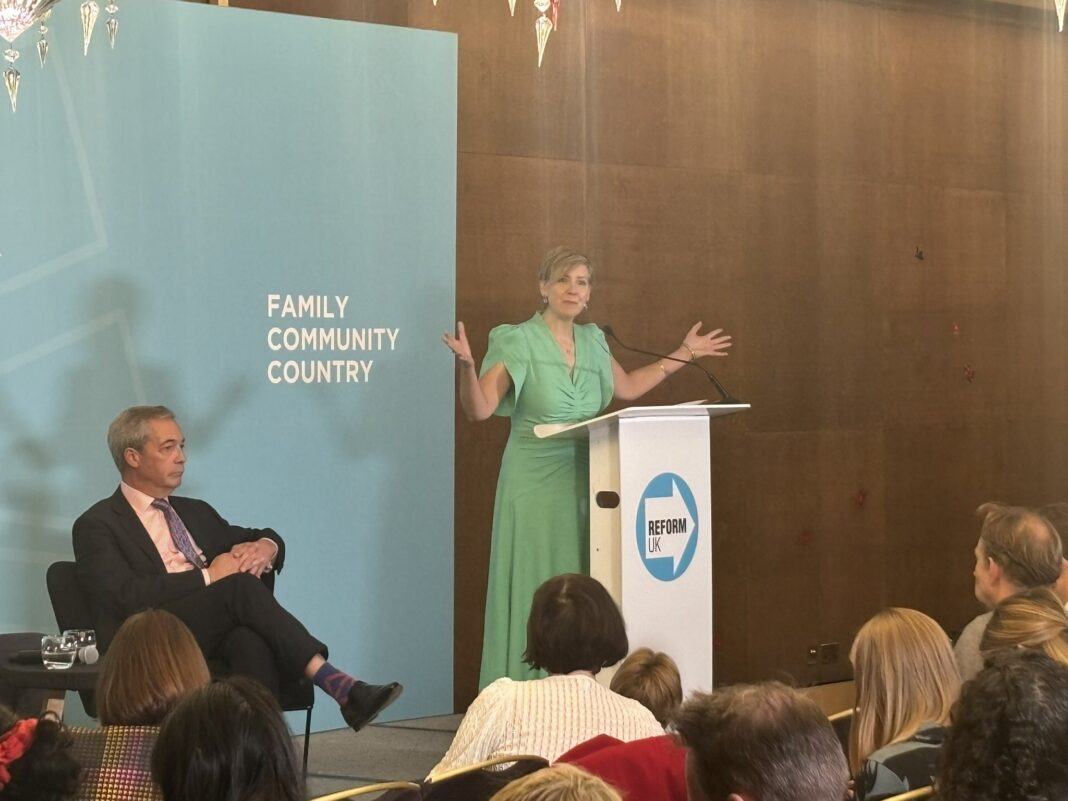28 NOVEMBER 2024 | NEWS
The former Conservative Undersecretary for Skills, Dame Andrea Jenkyns, has today announced her intention to run in the Greater Lincolnshire mayoral election, under the banner of Reform UK.
It comes as she formally announced her defection to the party this morning at a press conference in Westminster. She was speaking alongside party chairman Zia Yusuf and current leader Nigel Farage, now the MP for Clacton.
Addressing journalists, she said: “In times of crisis, we need strong leadership. We need those patriotic bravehearts to be the true voice of the people, and Reform is that voice.
“We need a party that champions truth, that stands up for the underdog, and that listens to the people – and this is why I have joined Reform.
“I always do what is right, and I always take the common-sense approach.”
Opening the event, Mr Yusuf referred to the recent surge in the party’s membership, announcing that it had now surpassed 100,000 as of this week.
Former party leader and now MP for Boston and Skegness, Richard Tice, was also present at the event, but did not give a formal address.
“We need strong leadership … this is why I have joined Reform”
Speaking at the press event, Mr Farage echoed Mr Yusuf’s sentiments as to the membership figures, which are approaching the Conservative Party’s most recent membership count of 131,680. He further noted the “sheer coincidence” that Dame Andrea was in fact the party’s 100,000th member.
Referring to the party’s polling at around 20% nationally, he added that its ground strategy would mimic that of Paddy Ashdown – a former leader of the Liberal Democrats – to gain thousands of councillors in next year’s local elections, on the road to expanding its new presence in Parliament.
He further stated that over 1,000 councillor candidates had already been vetted and selected by the party – in a process that he described as the most stringent of any UK party – with a view to standing in wards up and down the country. This follows Reform’s two recent gains in councillor wards in Kent, alongside a further defection in Barnet.
Over 400 local branches are also understood to have been set up over the course of the past year, which have been holding canvassing events and engaging with local voters.
Without access to the vast store of Voting Intention (VI) data held by the two main parties, Reform UK is seeking to develop its ground force operations.
It follows a recent petition for there to be another General Election, created by West Midlands publican Michael Westwood, which has since gained over 2.8 million signatures at the time of writing. The incumbent Labour Government has dismissed it thus far.
Dame Andrea further voiced her disillusionment with her former party, but said she had chosen to “go down with the ship” at July’s election – when she lost her seat – rather than defecting to Reform when other sitting MPs, such as Lee Anderson, had done so beforehand.
But her defection had long been rumoured in Westminster circles, Wolves understands. Former MPs Scott Benton and Marco Longhi are also understood to have been considering defection, prior to losing their respective seats at the last General Election on 4 July this year.
Dame Andrea also told Wolves that she was uncertain whether she would stand as an MP for Reform UK at the next General Election, or by-election, if her bid for the mayoralty were to be unsuccessful – nor where she might stand, adding that she had “not thought that far ahead”.
“Go down with the ship”
Speaking to Wolves, when asked what he would do on day one if he became Prime Minister, Mr Farage said he would introduce legislation to begin repealing the 1998 Human Rights Act, which he excoriated for causing a crisis in the UK’s ability to deter and deport many illegal migrants.
During his address, when asked about migration figures, he also mentioned that it was not viable for the UK for properly control its borders unless it withdrew from the European Convention on Human Rights, which has long been his position. This is in contrast to new Conservative Party leader Kemi Badenoch, who has dismissed the policy along with present Prime Minister Sir Keir Starmer.
Mr Yusuf also told Wolves that young party members should make an effort to attend branch meetings in order to build a youth movement. However, when asked about this, Mr Farage indicated it was not his understanding that such a movement presently existed.
Wolves understands that, while deemed important in principle, the foundation of a youth movement and – in particular – the appointment of an official Youth Spokesperson were not considered a priority in practice, but rather as more long-term goals.
It comes following the setup of a website in recent months by young activists, asking Mr Farage in an open letter to agree to several terms under which they would be willing to work with the party to establish a formal youth movement. Mr Farage is not understood to have responded at present.
However, the party is presently understood to be focusing on the May local elections and building up both its internal and external infrastructure, alongside the further professionalisation of its operations to build a coalition of local, regional and parliamentary support.
Further announcements on the party’s electoral strategy are anticipated in due course.
Additional reporting by Darius Hutchinson.

























